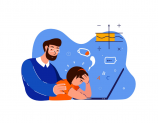10 Tips to Empower Your Child to Become a Responsible Social Media User
10 Tips to Empower Your Child to Become a Responsible Social Media User

Headlines and news flashes relentlessly bombard already stressed-out parents with a myriad of risks linked to their child’s social media use. Navigating the digital landscape becomes an overwhelming task for concerned and caring parents. In a world where technology seamlessly integrates into our daily lives, how does one raise a safe, healthy child given these omnipresent social media influences? Cautioning parents about the potential dangers of social media on a child’s developing brain is similar to informing someone that the air they breathe contains toxins. Both warnings offer a hefty dose of apprehension without providing sufficient guidance on how to remedy the foreboding situation.
Addressing any and all complex challenges requires nuanced and multifaceted solutions. Consider, for example, how difficult weight loss can be. If shedding pounds were as simple as “just eat less” or “just exercise more,” the booming weight loss industry wouldn’t exist. Losing weight involves a combination of factors, including dietary choices, physical activity, and mental well-being. Likewise, managing a child’s exposure to social media isn’t a straightforward task of “just keeping them off.” In a world where connectivity is intertwined with everyday life, such a simplistic solution overlooks many practical aspects and requirements of modern living. Determining a social media usage plan that will work for your child and your family requires a thoughtful blend of education, open communication, setting boundaries, and the lifelong development of a healthy relationship with technology.
Social media is like the digital equivalent of sugary snacks. Both trigger pleasure centers in the brain, and too much of either can lead to a craving for more. While it’s tempting to simply cut off access to both sugar and social media, an all-or-nothing approach will not set your child up for a lifetime of self-regulation and effective decision-making. Instead, it is critical to assist your child in learning to navigate temptation and find a balance between what feels really good in the moment and what will make life better in the medium to long run.
Just as it is cause for concern if a child were to grow up with no access to sugary foods and then go off to college or live on their own and then go on a sugar bender, you don’t want your child to grow up without the skill of learning to navigate the digital world. By allowing age-appropriate access, you can provide them with the opportunity to practice self-regulation – an essential skill for making tough choices throughout their lives.
You can’t (or shouldn’t, no matter how badly you may want to) control the experiences your kids will face 100% of the time, whether it’s what they buy at a candy store or what they engage with on their social media feed. Instead, you can equip them with the tools to make responsible choices, teaching them to enjoy the dopamine-infused “guilty pleasures” of life as well as the substantial joy that can be accessed through hard work, dedication, and an ongoing commitment to longer-term goals.
10 Tips to Empower Your Child to Become a Responsible Social Media User:
- Offer Open Communication vs. Judgment: Foster open and non-judgmental communication with your child. Encourage them to share their online experiences, questions, and concerns. Make sure they feel comfortable coming to you with issues and mistakes.
- Educate via Science-Based Information: Teach your child how the rush both you and they experience when a “like” is obtained is due to receiving a small hit of dopamine, a neurotransmitter associated with pleasure and reward. Dopamine is like the brain’s way of saying, “Hey, this feels good, let’s do it again!” It’s a crucial player in the brain’s reward system. Every like, comment, or share triggers a release of dopamine, creating a cycle of seeking and reward. This loop is part of what makes social media addictive – we crave those positive reinforcements and keep coming back for more.
- Encourage Responsible Choices: Empower your child to make responsible choices. Teach them the art of balance, guide them through the temptations, and help them develop the self-regulation skills necessary for a lifetime of effective living.
- Model Responsible Screen Usage: Children learn by example. Demonstrate responsible and positive online behavior yourself. Show them how to use social media mindfully, respectfully, and responsibly. Point out the guardrails you put in place for yourself to avoid going down a negative social media spiral. Your actions speak louder than your words.
- Utilize Parental Controls Judiciously: Implement parental control features on devices and social media platforms with caution. While these tools can be helpful, use them as a means of guidance rather than strict control, allowing your child to develop their own decision-making skills.
- Teach Online Safety Practices: Review the importance of privacy and online safety. Educate your child on creating strong passwords, recognizing and reporting inappropriate content, and being cautious about sharing personal information.
- Stay Informed Together: Make it a family based commitment to stay updated on the latest social media trends, apps, and platforms. Make learning about the digital landscape a shared experience, allowing you to navigate challenges and discoveries together.
- Encourage Offline Engagement: Encourage your child to participate in offline activities such as sports, hobbies, and socializing with friends. Promote a well-rounded lifestyle that extends beyond the digital world.
- Establish Tech-Free Zones and Times: Designate specific areas or times in your home where technology is not allowed (for anyone). This can include meal times, bedrooms, or family outings. Creating tech-free zones enhances opportunities for enhanced connections and deeper engagement.
- Create a Family Media Plan: Collaboratively design a family media plan that outlines rules and expectations. Discuss the importance of responsible online behavior, set guidelines for sharing content, and revisit the plan regularly to adapt to changing circumstances and technologies.
By fostering open communication and instilling responsible habits, you can empower your child to manage the ever-evolving landscape of technology and social media.
















